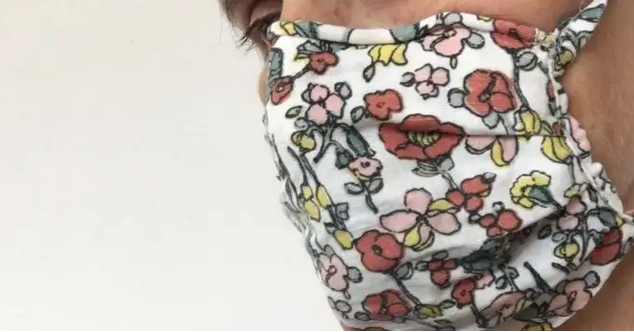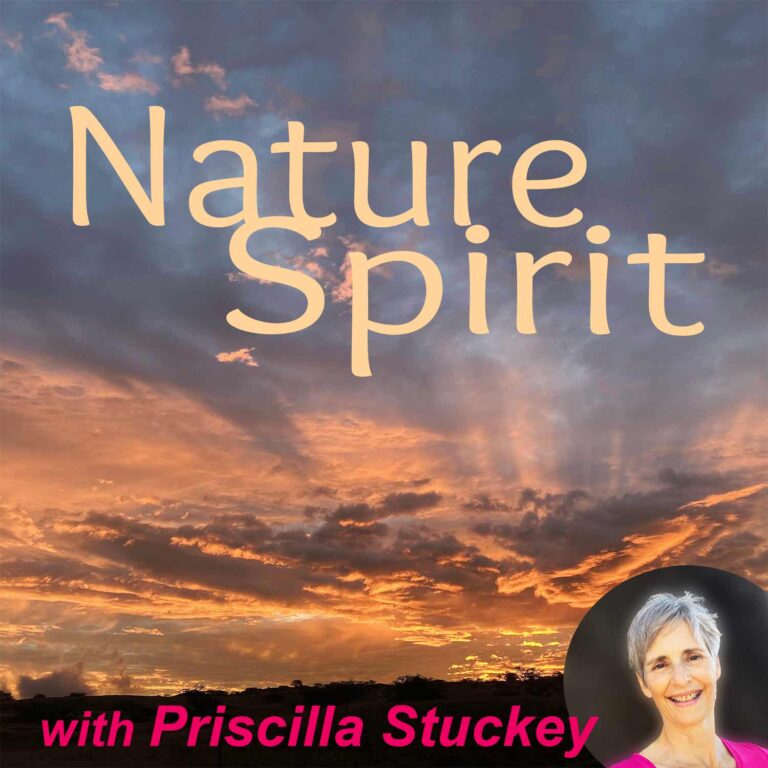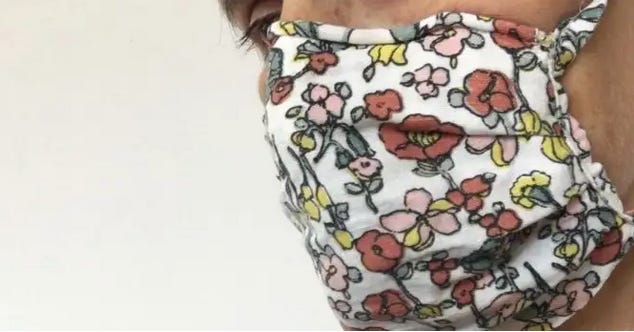Transcript
What a time we’re living through! A time we couldn’t imagine just a few months ago, when we used to hug each other! And leave the house without wearing a mask!
Here in Hawai’i everyone took the virus very seriously from the start. People sheltered in place. Medical people set up testing sites and contact tracing. And everyone—I mean everyone—wore a mask. Even now most people still do.
 But in other parts of the country, cases are rising fast, and many people are refusing to wear masks. And that’s another thing I couldn’t have imagined—people getting angry about the idea of wearing a mask. It’s clear that refusing to wear a mask is connected to a denial of science in general, because if you look at the numbers there’s an overlap between people who deny climate change and people who refuse to wear masks.
But in other parts of the country, cases are rising fast, and many people are refusing to wear masks. And that’s another thing I couldn’t have imagined—people getting angry about the idea of wearing a mask. It’s clear that refusing to wear a mask is connected to a denial of science in general, because if you look at the numbers there’s an overlap between people who deny climate change and people who refuse to wear masks.
But I see something else too, or maybe I’d just phrase it differently. I see not just denial of science; I see denial of nature itself. Every time someone claims the virus is a hoax or refuses to wear a mask, I see someone who is deeply estranged from nature. In other words, from reality. I see someone trying to erase reality instead of come to terms with it.
I confess; I get annoyed by these displays. But anytime I feel that rush of annoyance, I’ve come to see it as an invitation to slow down and open my heart a little more and look more deeply at what is going on. And when I do that, I see something more. I see fear. That degree of denial arises out of fear.
We talk about denial as a stage of grief—the first stage of grief, when the reality of the loss we’ve just experienced is too big to comprehend, so we push it away. The mind tries to act like it didn’t happen. We refuse to believe it.
But you can interpret that first stage of grief also as fear. Being overwhelmed by terror. Someone we love just disappeared, and it’s unfathomable. We’re terrified to live in a world where this can happen, and we’re terrified to go forward without them. So we say no to what comes next. No, no, no.
As far as I can tell, climate denial works the same way. Over decades the evidence mounts that we humans are harming this world, that we’re threatening the very foundations of life on Earth as we know it, and we can’t comprehend such a thing; we can’t look this reality in the face. It’s too terrifying. So at the very moment when the scientific evidence on climate change became irrefutable, that was the same moment when the most rigid climate denial set in. No, no, no.
And now here comes a virus, so small we can’t see it but so mighty that it is robbing people of their lives. We don’t want to think about how vulnerable we are. So the first instinct of many is to deny it. No, no, no.
I get that fear. I really do. Reality is terrifying. Nature is terrifying. Earth is not a safe place!—if being “safe” means facing no threats. To live here is to know that our life could be snatched away at any moment—by an accident, by a heart attack, by any of the life- and death-dealing forces that swirl around us and inside us every day.
I’ve experienced earthquakes and forest fires and floods, and I felt terrified with every one of them. I know the fear of tornadoes and mudslides and falling trees. Every time I swim in the ocean these days, I feel a small undercurrent of fear, for I know that all it would take to paralyze my body or even to end my life is an errant wave hitting the shore just right—or just wrong. Wind, water, fire, and earth hold powers of life and death that we cannot fathom. In their presence we are always in jeopardy.
So to live with this amount of uncertainty, we naturally build defenses. And our first line of defense is often denial.
It would be tempting to think that the remedy for this refusal to wear masks is to change the minds and hearts of a few misguided people. But this is not an individual problem. It’s a symptom of our whole society’s broken relationship with nature. And at the heart of this broken relationship lies a story of nature that is not serving us. A story that doesn’t help us make sense of our vulnerability. And that doesn’t help us come to terms with illness and dying.
Western culture’s story of nature emphasizes birth and growing and success—always success. We want our life indicators to always be rising. We don’t like the aging half of things, the ebbing of life, the weakness that comes with being ill. We’re not so crazy about the death that follows just out of sight and eventually will catch up with us.
And that so many are refusing to wear masks highlights this broader refusal of vulnerability and illness and death. It’s like denial amped up on positive thinking: “If I refuse to wear a mask, I can refuse to be infected. I can show my power over a virus. Maybe I can even cheat Death.”
But nature doesn’t work that way. Viruses don’t work that way, and death certainly doesn’t either. Death will come for each of us—and in a pandemic, likely sooner if we don’t wear a mask! And when Death does come, it will call into question all those props we grabbed at to keep us safe.
One of those props is race. It’s no accident that most of the people refusing to wear masks are white people—because whiteness helps people feel more safe, more insulated from uncertainty. White people have more access to the structures that support people’s health, like better hospitals and nicer neighborhoods with cleaner air. Yes, privilege helps us white people feel more superior than others, but it also helps us avoid the worst effects of floods and tornadoes and climate change. It helps insulate us, comparatively speaking, from nature.
But Death doesn’t see skin color. Nature’s biggest and deepest and hardest teaching is the great democracy of dying—and this democracy includes us all. No exceptions. So coming to terms with nature means opening ourselves and our lives and our society to equality. Complete equality. The equality that forms the bedrock of the natural world.
Getting close to nature, in fact, tends to call a lot of beliefs into question. We may start our journey with nature, as I did, by connecting with a tree or a bird or an animal, but truly listening to what other beings of nature have to say will change a person. It will likely challenge some familiar assumptions about the world, and it will definitely tweak some favorite pictures of reality. I find that a path of connecting with nature involves a great deal of letting go—opening myself, over and over again, to reconsidering things I used to take for granted as true.
And each of these moments of letting go holds its own terror. I know, for every time I have given up a misguided picture of reality, I have felt that fear. It’s like holding onto layers of gauze between me and reality. Before I let one of those gauze curtains drop, there is always a moment—or a week or a year or a decade—of terror. Where will I be without this familiar layer of protection?
But let go of the gauze, let it drop, and the vision clears. The mist is gone. Reality is suddenly more available than before. And way more beautiful. Because every time we drop one of these layers, the heart becomes more available, and more loving.
So making peace with nature is actually a culture-wide job. And it’s the job of a lifetime. It’s a job of reconciliation. Reconciling with Life itself. With Death itself. With the very process of living and dying on Earth.
And here’s the other thing about making peace with nature. Human beings have been doing it for at least 200,000 years. And most of that time we did it by supporting one another. By sticking together and comforting one another when the earth rolled or the waters rose or the fires destroyed all our traces. Because nobody survives on their own, and nobody recovers from loss on their own. We all need help in facing reality and moving forward.
This pandemic gives us many opportunities for dropping the false masks—the layers of insulation we hold up between ourselves and reality. And it offers many opportunities too for healing our story of nature so that it finally includes the experiences we’d rather not face—of illness and vulnerability and dying. And it’s offering us a great many chances to help each other through grief and loss so that we can move forward. Together.
So I wish you courage. Life is terrifying. I wish you bravery, over and over again, to face reality however it presents itself to you. And I wish you the joy of seeing more clearly, and the love that flows when the heart has opened just that wide.
For digging deeper
The story of Hawaiʻi’s so-far largely far-sighted response to the virus appeared recently in Politico.
A connection between mask refusers and climate deniers emerged from an April poll of 2,200 respondents conducted by Morning Consult. Jenessa Duncombe at Eos News and Judy Fahys at Inside Climate News both covered it.
Will Bunch is spot-on in linking mask refusal to white supremacy in his recent Philadelphia Inquirer op-ed.
See the previous episode, “Listening to nature,” for my story of beginning the lifetime journey of connecting with nature. And see “Making a dragonfly friend” for a simple example of connecting with another being for a few moments in everyday life.

















Thank you Priscilla. Perfect timing as yes it is so easy to become annoyed with those resistant to the allure of a mask. Thank you for connecting those many dots, particularly to climate. There are endless dots to connect these days. These are days when it’s easy to overlook those connections —- which give us connective structures. Thank you for helping me see the armatures for ongoing building and creation. Grateful for your insights. Always.
Seeing the “armatures for ongoing building and creation”—what a beautiful way of saying it! Glad to be part of the creative process. Yes, this is a fertile time—a time of dying and of being born. Grateful always for your company!
Thanks for speaking the truth. Beautifully said.
Glad you enjoyed, Kathy. Thanks for stopping by.